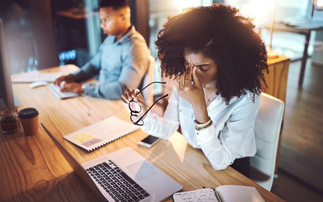SMP Healthcare director Lianne Harrington asked her team 10 questions, this is what she found out
With so many people working from home, faced with a health crisis of never-seen-before scale, it's no wonder that mental health and wellbeing has become such an important issue for employers in recent times.
Despite endless video calls, messaging services such as Whatsapp and, of course, constant email communication, private medical insurance (PMI) broker SMP Healthcare decided that more information was needed to find out how its staff was coping in such unusual circumstances.
The firm's director Lianne Harrington asked a set of 10 questions to find out more. The answers she received from just three members of staff revealed the extent to which the current situation is affecting different people in significantly different ways. This is what she learnt.
Q1. When the current Covid-19 pandemic was in it's infancy at the beginning of 2020, were you worried about what this would mean for you and your family?
Actually, I was not worried at all, in fact I can remember having a conversation in the office about it and could probably even be quoted as saying "it won't come here, I don't know what you are worrying about. China is a long way away you know!" How wrong could I be?
Yes, but I am quite an anxious person, so for me I found it quite difficult and my brain went into overdrive very early on as to how this could affect me and my family.
Whilst the Covid cases were contained within China I didn't have any concerns as I really didn't think it would spread to the UK but as soon as it did start spreading to the UK and other European countries, I started to worry. Not only was I worried about myself as I'm high risk, I was also worried about the older members in my family both in the UK and abroad. My worry was that if any of us contracted it, we would be unlikely to survive it, due to age and/or underlying medical conditions.
Q2. When the government announced in March 2020 that those who could work from home should work from home, were you pleased or disappointed?
I was really disappointed. I love getting into the office and working with colleagues in a face to face environment and have a great bunch of friends I catch the train with and have done for a number of years. The thought of working from home for even a month seemed so surreal, little did I know that that few weeks would roll into a few months.
Pleased. I love my job and my colleagues, but I am an introvert and so quite happy to work from home and with all this going on feel safer doing it this way.
Yes, I was very pleased as I knew I would feel safer at home. I wasn't happy going to the office every day because of coming into contact with other people there, as although I was being careful, I couldn't be sure that other staff members were also being careful.
Q3. Did you find it hard to work in your home environment and did you have to make any adjustments to accommodate this?
Work was not really an issue from home although I only had a really small computer workstation so after a couple of months went by, I gratefully received a freebie desk from a friend with a more comfortable chair too. The thing I found most difficult was taking time away from the computer screen. My travelling time was replaced by additional screen time and my eyes have really suffered. As soon as the opticians opened again I had to get a new prescription, it could be coincidence but I really don't think it helped.
No, not at all. I have a separate area where I can work away from my family and we already have a computer at home.
No, I found it really easy working from home and apart from needing to use the company's laptop, no adjustments had to be made.
Q4. Was a daily call from management enough for you or did you feel that there should have been more contact?
One of my colleagues set up a WhatsApp group and we all sent a "funny" good morning message to each other practically every day. Unless there were specific issues, I think one call was enough. We emailed on a regular basis anyway.
For me a daily call was fine and if I had any issues I knew I could simply call management for assistance.
For me, a daily call was more than sufficient. It was good to be able to catch up on the previous day's events and discuss anything in the pipeline.
Q5. Did the fact that you were placed on furlough make you feel nervous about the long term stability of your job role?
Fortunately I was never on the furlough scheme and therefore this wasn't an issue for me at the time although of course, the worry for other people was still there.
Yes, but again I am a very anxious person and this was something totally new and like a lot of people I am sure they also thought the same as no one knows how this pandemic is going to affect their jobs.
Yes, absolutely. It was a very unnerving time and not knowing what the future held jobwise was very stressful. Added to the fact that I was concerned about contracting Covid, I felt extremely anxious and felt very unsettled.
Q6. When you were on furlough, did you struggle to motivate yourself to live a "new normal" life?
Again, this didn't apply to me, I was lucky to be working the whole way through.
A new normal life, that's such an odd phrase, but it's true I suppose especially for those that used to go out and socialise on a daily basis. For me, nothing much has changed, I enjoy spending time at home with my partner and little girl, but I miss seeing my family and when restrictions were in place I did find that extremely hard, but I kept telling myself, this isn't just happening to me. We are all going through this bizarre time in life together.
I found it really difficult to get to grips with the "new normal" and on the rare occasions that I went out it was with trepidation. I knew that I had been following all the rules but was concerned that other people hadn't been doing the same. Because of my uncertainty, I felt safer being indoors.
Q7. Did you miss going to the office and meeting with colleagues on a daily basis or were you happier in your safe, home environment?
Well I guess I didn't miss paying the travel costs but yes, 100% I think it is much better working in the office although I also believe we have a responsibility to follow the government guidelines and work from home - because we can. Yes I know being at home was the safest place to be but I would definitely rather be in the office. My personality is not suited to long days on my own in the same four walls.
I do miss seeing my colleagues and having that face to face interaction with them, but we are well connected working from home and keep in contact with each other on a daily basis so it doesn't affect me massively and I feel safer and happier working from home.
In all honesty, I didn't miss going to the office. I much preferred being at home. Not only did I feel safer in my own little hub but I felt that I worked better as I wasn't feeling so anxious. Even now, my home is my safe place.
Q8. How did you feel when you were removed from the furlough scheme and asked to work full time again?
Not applicable to me.
Relieved. I love what I do and for me personally, work is a great form of escapism, and it certainly helped take my mind off of what was happening in relation to the pandemic.
I felt relieved when this happened as it meant my job was safe. The uncertainty of my job was constantly worrying me.
Q9. What about coming back to the office, were you nervous about returning on the 10 August 2020?
Not at all. The daily figures were really calming down and again, as soon as Boris Johnson actively encouraged people to return to the workplace then I could have jumped for joy. I could not wait to get back to the office and experience a little bit of normality. It was great to see everyone on a daily basis again.
I was nervous about returning to the office, although management made the necessary adjustments for us to return, it still didn't take away my anxiety and thoughts about potentially catching the virus or even passing it onto colleagues as a potential carrier.
I didn't like going back to the office at all. I felt nervous and anxious, particularly as I use public transport for part of my journey. To try to minimise my nervousness, particularly with my journey, I started driving to work but car parking is very costly, so I won't be able to do this all the time. Also being in the office where at times there could be up to 7 people there has been worrying as other people come in my public transport and could well be a carrier of the virus. And of course, I would not be aware of who they are mixing with outside of the office.
Q10. Now that you are once again working from home, has your feeling changed about doing this changed in anyway?
No, I have resigned myself to the fact that this is how it has got to be even if it is another 6 months. It doesn't affect my work or my clients and all of the insurers are still accessible. Obviously I wish it was different but if by working from home it means we avoid a full lockdown and I can still spend time with my parents then that's far better in my book. I really hope we are back to the office before 2021 but at this moment in time I cannot see that happening.
No as I feel I am happier and more productive working from home. I find it easier to concentrate and it has definitely had a positive impact on my mental wellbeing.
No, my feelings are the same as before. Home is my safe place and so working from home lessens my anxiety and makes me happier. I am thankful that I have a job that enables me to work from home.
Lianne Harrington [pictured], director for SMP Healthcare, told COVER: "2020 has been a tough year for employers and employees alike, albeit for different reasons. As an employer I am concerned about the effect that Covid has had on the mental wellbeing of my staff and the best way to find out was actually to ask them the questions.
"Asking 10 simple questions provided me with a huge insight into the minds of my team and as a health insurance broker I really could not ignore the answers. It is evident that the pandemic has caused their anxiety and stress levels to increase dramatically.
"The answers the team have provided made it crystal clear that as a business we needed to implement a staff wellbeing programme immediately. As a health insurance broker, I guess we were in an ideal position to know where to begin the process.
"Our staff support programme was in place by 1 November and the team now have access to all the help that they need.
"As health and wellbeing is the core focus of our business as a health insurance intermediary it is obvious that if more businesses could see the value of undertaking a survey of this nature then we could also help them to find the right solution.
"The cost of implementing a staff wellbeing programme is actually negligible in comparison to the cost of absenteeism or presenteeism that could have easily been prevented."












